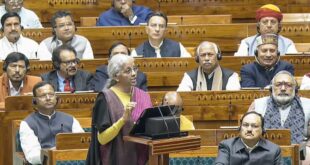 Even before her soulful, mystical voice creates its magic and captivates you, it is her charismatic persona that hits you with an intensity that is overpowering. Doyen of Hindustani Light Classical music, Karamveer Noble Laureate, Rekha Surya enjoys the distinction of having been trained by two legendary music maestros- Begum Akhtar (Lucknow gharana) and Girija Devi (Banaras gharana). She amalgamates the nuances of both these schools and presents Thumri, Dadra Ghazal style to which she adds the mystical dimension of Sufi poetry.
Even before her soulful, mystical voice creates its magic and captivates you, it is her charismatic persona that hits you with an intensity that is overpowering. Doyen of Hindustani Light Classical music, Karamveer Noble Laureate, Rekha Surya enjoys the distinction of having been trained by two legendary music maestros- Begum Akhtar (Lucknow gharana) and Girija Devi (Banaras gharana). She amalgamates the nuances of both these schools and presents Thumri, Dadra Ghazal style to which she adds the mystical dimension of Sufi poetry.
Her concerts are stamped with her own distinctively individualistic
She is an artist with a soul and unlike many singers who would prefer to just perform and go Rekha breathes secularism into her singing and even talks about this on social media hence she has been a target of trolls. Her anti-government posts have resulted in her being blocked thrice by Facebook too, but all this has failed to dissuade her from what she calls a a musical path strewn with the right human values.

In this candid interview, Rekha Surya talks about the trials and tribulations of an artist with a soul. Refusing to bow down to these paper tigers she says she will remain loyal to her cultural ethos till her last breath. A true Lucknowite now based in Delhi, Rekha says she always carries Lucknow in her heart wherever she may be.
Q: A convent girl, with a heavily anglicized childhood how come you opted to take up Hindustani Light classical music as your career choice.
A: There was an overpowering spiritual connection that I felt with this music right from my childhood. While it is true that my family was baffled by my choice they never opposed my musical endeavor and in fact helped me chase my dream. I visited my first ustad Begum Akhtar with a family friend at the age of eleven. Initially, she bluntly refused to take me as her shagird (disciple) as she was not training due to ill health, but then she just asked me to sing something, and when I finished she simply said “kal das bajey aa jana” (come tomorrow at 10 am). And after that for the next two years, she devoted so much time in shaping me, her last disciple. I owe her so much for what I am today.
Q: How did you find your second guru Girija Devi ?
Again it was sheer quirk fate of destiny. The sudden death of my ustad Begum Akhtar had created a hollow in my life, I was totally devastated, my world had collapsed. As luck would have it I found my second Ustad Girija Devi at a private concert. My passion and zeal to learn made her decide to take me under her musical wings. It was clear that destiny had carved out my musical path.
Q: Throw light on your activism through music?
A: I did not just learn music from these two legendary gurus but they also created in me a love for humanity at large. Music, I learned very early in life does not just transcend geographical boundaries; it also has the power to unite people and faith, it can help create bonds between humans as well as nations. I have been using music to build bridges ever since I started my musical walk.
Consciously I started practicing activism through music after the barbarism that followed Babri Masjid demolition. The venom, bitterness, the loss of human lives, all impacted me. I turned to Sufiyana kalaam, introduced dohas of Kabir in my concerts to convey the agony, pain of an artist. I used poets who conveyed these thoughts, supported communal harmony. I want music to be the bonds of love, not hatred. I do not care if anyone abuses me for my message of kindness and peace. I challenge people who want to spread disharmony through my musical strains.
Q: You were born to refugee parents who migrated from Lahore to Lucknow during Partition. Did they not pass on their insecurities to you and your other siblings?
A: Not at all. In fact, my father, a real ‘Brown sahib’, especially choose to settle down in Lucknow knowing it had a predominately nawabi stamp but it was the rich cultural ethos of Avadh that attracted him and he never regretted his decision till he crossed the rainbow in 1993. There were never any talks of hatred for any communities or blame game for the change in our lifestyles. The family enjoyed a lot of clout and respect back in Lahore. My father’s elder brother was the first Indian to teach Medicine in London.
But yes, the financial insecurities were often spoken about. I had a beautiful childhood. Irish nuns taught us in Loreto Convent, we had Muslim khaansamas (chefs) preparing our lunch, while for dinners we had English food. It was the best of east and West and one which instilled in me the love for harmony and humans.
Q: Do share with us your pandemic creativity.
A: It has been a difficult time for humanity at large. My heart bleeds for the families who lost their dear ones. But one big blessing of the pandemic is that it taught us to value time, relations and to use the time to promote our creativity. For me, this period has been a boom. It helped me hone my online lecture skills. I can now conduct my music classes and connect with my students abroad as easily as those in India.
Another important thing that happened during this trying time was that I got a chance to participate and do my bit for fundraising for Corona-19 relief through my online concerts. So I can say proudly that I utilized the lockdown time for my personal and professional growth and for the good of humanity.
Q: Outside India, you have performed in Washington D.C, New York, Boston, Philadelphia, Los Angeles, Madison, Chicago, Toronto, Montreal, Ottawa, New Foodland, Oslo, London U.K., Sri Lanka, Tajikistan, and Singapore. But it is your three Pakistan tours that we would like you to dwell on.
A: I strongly believe that cultural exchange programmes- people-to-people contact are a must for keeping intact relations between nations no matter what the political ideology they share. However, they are more important between countries like India and Pakistan as they help mend or melt fences of enmity and ill will between the two nations.
My three concerts in Pakistan were a super, duper success. I enjoyed performing for them as I think they enjoyed my performance. The audience also looked almost like the one in India- appreciate and interested. I made many friends across the border and am still in touch with them on Whatsapp and Facebook.
Q: Is classical and semi-classical old-fashioned and on the wane in this jet-paced era?
A: Good music can never get out of fashion or lose its control over its audience.
After Begum Akhtar’s death, Ghazal was popularised in the Geet numa style of Jagjit Singh Mehdi Hasan was respected for his Khayal ang style. even though this style of singing was considered “old-fashioned”. But Rekha Ghazal is best presented in the classical-romantic Thumri style and sings Ghazal alongside other forms that belong to this genre, like Dadra, Hori, Jhoola, Kajri, and Chaiti.
Q: Your book
A: I have attempted to succinctly map the history, philosophy, and practical aspects of Hindustani light classical music. It is illustrated with inputs I gathered while training under India’s two legendary teachers.
Q: Despite your huge social media presence you are a very private person, but still I cannot help asking you why you did not marry?
A: Yes I do not like to discuss personal and intimate things about me publically. About why I did not marry you can just say that I choose to be single because the person I loved I could not marry. What her words did not say she communicated through the couplets of one of her favorite Urdu poets Israr Ansari.
“ woh itni door ho gaya jitna karib tha, hum na unkey na who humarey hain ,
dona darya key do kinarey hain.
It was time to say goodbye bye to Rekha Surya now, she was already transported into another world, a word that she has aggressively guarded all these years and wherein hangs the permanent “no entry Sign”. Behind its locked doors lie memories, nostalgia, and pain that she would not like to share with anyone. A poet has rightly described failed love as Yaadey maazi azab hain yarab ( memories of the past are traumatic).
 Jubilee Post News & Views
Jubilee Post News & Views





